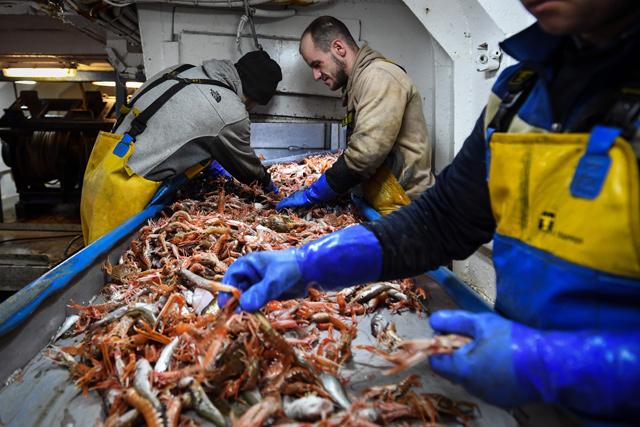- International News
- Sun-2021-01-10 | 03:23 pm

Scottish seafood exporters said on Friday they were facing a "perfect storm" from post-Brexit red tape and coronavirus restrictions, which could threaten the future of the industry.
Donna Fordyce, chief executive of Seafood Scotland, said companies had faced a "real challenge" with new customs checks and paperwork, on top of curbs to stop the spread of the virus.
"It's all Brexit-related," she told BBC radio, complaining of "pinch points" in IT systems on both sides of the Channel in England and France.
"We wanted a six-month grace period where we could iron out all these issues, so that when the time came it would be frictionless."
Scottish seafood is mainly exported to markets in northern France, where it is then sold on across Europe. With a live product, time is of the essence.
Exporters warned of the risk of delays before Britain left the Europe Union's customs union and single market on December 31, even with a tariff- and quota-free trade deal.
But Seafood Scotland said firms had been hit by "layer upon layer" of administrative problems which had caused "utter confusion".
In addition, the closure of the French border before Christmas due to coronavirus fears had caused lengthy delays.
Fordyce said in a statement on Thursday that consignments risked going into landfill but also the slump in exports would give fishing fleets little incentive to put to sea.
"In a very short time, we could see the destruction of a centuries-old market which contributes significantly to the Scottish economy," she added.
"It's a perfect storm for Scottish seafood exporters," she said.
Scotland's Europe and External Affairs Secretary Michael Russell said the problems at the borders were "exactly the sorts of issues that Scottish ministers have been raising since the Brexit referendum".
Scotland voted to remain in the EU in the 2016 referendum. The devolved nation's governing, pro-independence Scottish National Party has said Brexit strengthened the argument for Scotland to break away from the rest of the UK.
"The UK Government, with their bad Brexit deal, chose to impose these extra burdens on business at a time of unprecedented challenge — which is utterly unacceptable and very damaging to the economy and for jobs," Russell added.
Jimmy Buchan, the chief executive of the Scottish Seafood Association, said earlier this week that trucks laden with fresh seafood were being held up in central Scotland due to problems with customs barcodes and lack of veterinary service capacity.
Entire trailers were being emptied so that every box and label can be checked, he said.
"Combined with computer problems on both sides of the English Channel, this is a worrying sign for the days and weeks ahead when the flow of produce will get much greater," he added.
"Ultimately our member businesses lose revenue and prices in the market become depressed in reaction to the problems.
"We are at the point now where the white-fish fleet may have to stop fishing.”













